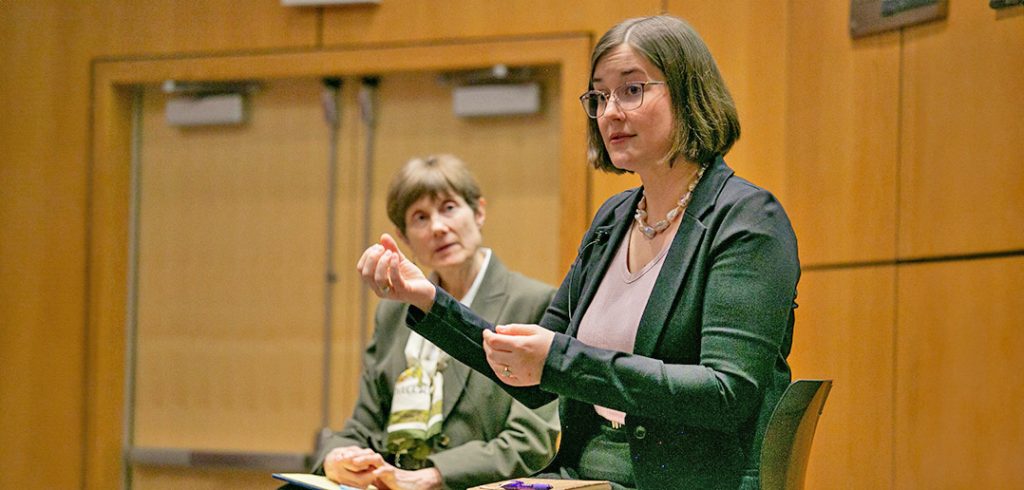Especially regarding the LGBTQ community, the Orthodox Church has consistently become “hung up on the division between Orthodox and un-Orthodox, the division between holy and unholy, taboo and sacred,” said Ashley Purpura, Ph.D., GSAS ’14, associate professor at Purdue University and visiting associate professor at Harvard Divinity School. “But there is a way that love is transcending [this divide].”
She spoke at “Seeking Harmony and Compassion: Helping Parishes with LGBTQ+ Ministry,” a discussion organized by Fordham’s Orthodox Christian Studies Center at the Lincoln Center campus. She was joined in conversation by Cristina Traina, Ph.D., Avery Cardinal Dulles Chair of Catholic Theology at Fordham.
“There is an urgency to the matter because [our churches] are turning people away who don’t feel they have a home,” said Traina.
Orthodox Christianity in the Modern World
Purpura noted that some portions of the Orthodox Church, notably the Moscow Patriarchate, have presented the LGBTQ community and pride parades as a part of a larger threat by the West to the church’s traditional values.
But others see a question of how the Orthodox Church lives out the Christian faith in the modern world. A growing number of clergy, laypeople, and academics—including Purpura—are offering a pastorally and theologically grounded response to ministering to LGBTQ Orthodox faithful.
Purpura studies how Orthodox Christian thought and practice in the Byzantine tradition haves shaped power structures, identities, and conceptions of gender. She was co-editor of Orthodox Tradition and Human Sexuality (Fordham University Press, 2022), which has a companion study guide.
Acceptance of the LGBTQ Faithful
During the talk, she touched on a number of ways that the Orthodox tradition can be a resource for acceptance of the LGBTQ faithful. For instance, gender binaries have been transgressed in the Orthodox tradition, she said, mentioning the case of Matrona of Perge, an Orthodox Christian female saint who lived for a time as a male monk.
Purpura also invoked the Orthodox tradition and, more broadly, Greek philosophy’s conceptions of love—including eros, or passionate love and desire, and agape, or selfless love for God and others.
In relationships filled with both, she said, “If we really see love—no matter what form it is taking—bearing fruit and already transfiguring that couple or those individuals, then I don’t understand how we can say that … this is not theotic,” transforming and advancing one’s relationship with God, or that “the presence of God [is not]in this union.”
She expanded this picture to include the entire church and all humanity, saying that divine-human communion “happens as a community” and in relationships. “It is not just an individual enterprise.”
‘Love Christ in Your Neighbor’
Thus, Purpura insisted that the Orthodox Church can no longer say the LGBTQ community does not intersect with the church’s past and present. Instead, all Christian communities are called to embrace all people through their capacity “to see Christ and love Christ in your neighbor.”
While maintaining the tradition as necessary and vital for the life of the Orthodox Church, Purpura emphasized that “what is most central, is our relationship with God, our experience of God’s love and communicating that love to others.”
“We cannot say we are loving God and then be cruel to the people who we encounter in our lives,” she said. “If you are not letting that love transform you and your relationships, then I do not know what Orthodoxy is.”
Orthodox Tradition and Human Sexuality resulted from a trailblazing project sponsored by the Oslo Coalition on Freedom of Religion or Belief that brought Orthodox clergy, academics, and laity together to engage in collective study and discussion.
— Harry Parks, Fordham College at Rose Hill, Class of 2024

